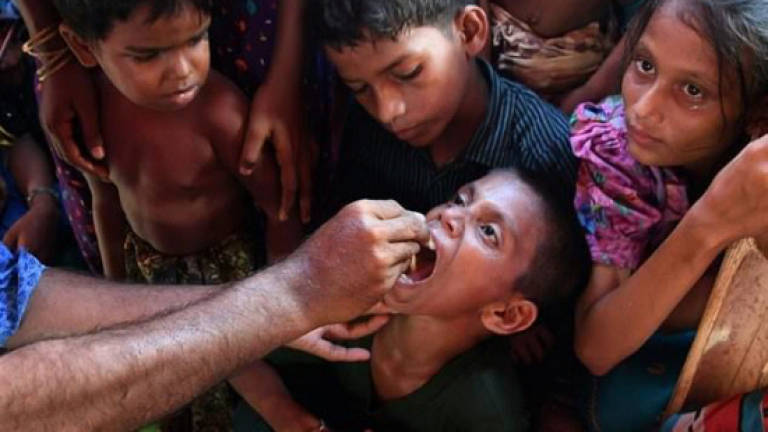Mass cholera vaccinations begin in Rohingya camps

THANKHALI, Bangladesh: The United Nations launched one of its biggest ever cholera vaccination drives in the vast refugee camps of southeast Bangladesh Tuesday amid fears of an outbreak among nearly a million Rohingya now living there.
Thousands of Rohingya men and women lined up in intense heat at makeshift health centres, many with young children in their arms, to receive the oral vaccine against the disease.
The UN is working with the Bangladesh government to vaccinate 650,000 people living in the sprawling camps against cholera, which spreads through dirty water and can kill if left untreated.
"These people lack most of the basic services – toilets, water sanitation and everything," Unicef spokesman A M Sakil Faizullah told AFP.
"When we have this kind of situation, there's a heavy possibility of a cholera outbreak."
Nearly 520,000 Rohingya Muslims have arrived in Bangladesh since late August, fleeing a military crackdown in neighbouring Myanmar's Rakhine state that the UN has said likely amounts to ethnic cleansing.
Poor and overpopulated Bangladesh has struggled to cope with the mass influx of people, many of whom have to travel for days or even weeks to reach safety and arrive exhausted and malnourished.
The influx had slowed in recent weeks, but now appears to have picked up again and an estimated 11,000 new refugees arrived on Monday.
The UN refugee agency said Tuesday it was working with the Bangladesh authorities to set up a transit centre in preparation for a fresh influx in the coming days.
Dozens feared drowned
Many of the new arrivals are from the Buthidaung district of Rakhine which lies relatively far from the border.
They told AFP the army in Myanmar had prevented them from buying food, making it impossible for them to stay.
"Some said they fled torching and killings back home ... Others said they left in fear ahead of anticipated violence," said Adrian Edwards, spokesman for the UN refugee agency.
An AFP photographer at the scene on Monday saw one distraught man arrive carrying the limp body of his infant son who had died as they crossed the Naf river that divides the two countries.
Dozens more are feared to have drowned when a boat packed with desperate refugees sank late on Sunday night.
Bangladesh police said Tuesday they had found 14 more bodies, taking the number of confirmed dead to 28, with scores more missing.
Across the border in Myanmar, hundreds of Rohingya were massed on the riverbank awaiting the opportunity to leave.
"We want to go to Bangladesh. It's over for us here. We have to cross quickly but we don't have the money to pay for the boat," one Rohingya father of four told an AFP reporter in Rakhine state.
The family had walked for several days from Buthidaung to reach the riverbank, where hundreds more Rohingya were waiting to escape. The majority were children.
'Huge undertaking'
World Health Organisation (WHO) workers and local volunteers plan to vaccinate 650,000 Rohingya over the coming weeks.
They will follow up with a second dose of the vaccine for an estimated 250,000 children aged between one and five. Those under one will not be vaccinated.
It the second biggest such campaign ever, after 800,000 people were immunised against the disease in Haiti in November.
Volunteers at the Thankhali camp used loudhailers to appeal to refugees to go to the centres, where they queued to have the vial placed in their mouths.
The WHO's Bangladesh representative N. Paranietharan called the vaccination drive a "huge undertaking" and said he was confident an outbreak would be averted.
He said thousands of Bangladeshis living near the refugee camps would also be vaccinated.
Cholera was a major killer in Bangladesh until in the 1970s, but the country has seen major improvements in sanitation facilities since then.
The Rohingya are a stateless Muslim minority who have long faced persecution in Myanmar, which regards them as illegal immigrants from Bangladesh.
The UN says more than 600,000 have arrived in the last year, swelling camps that were already home to between 300,000 and 400,000 refugees.
Bangladesh has allocated land to accommodate some 800,000 refugees in one massive camp, but the UN has warned that such a large concentration in one area could promote the spread of disease. — AFP